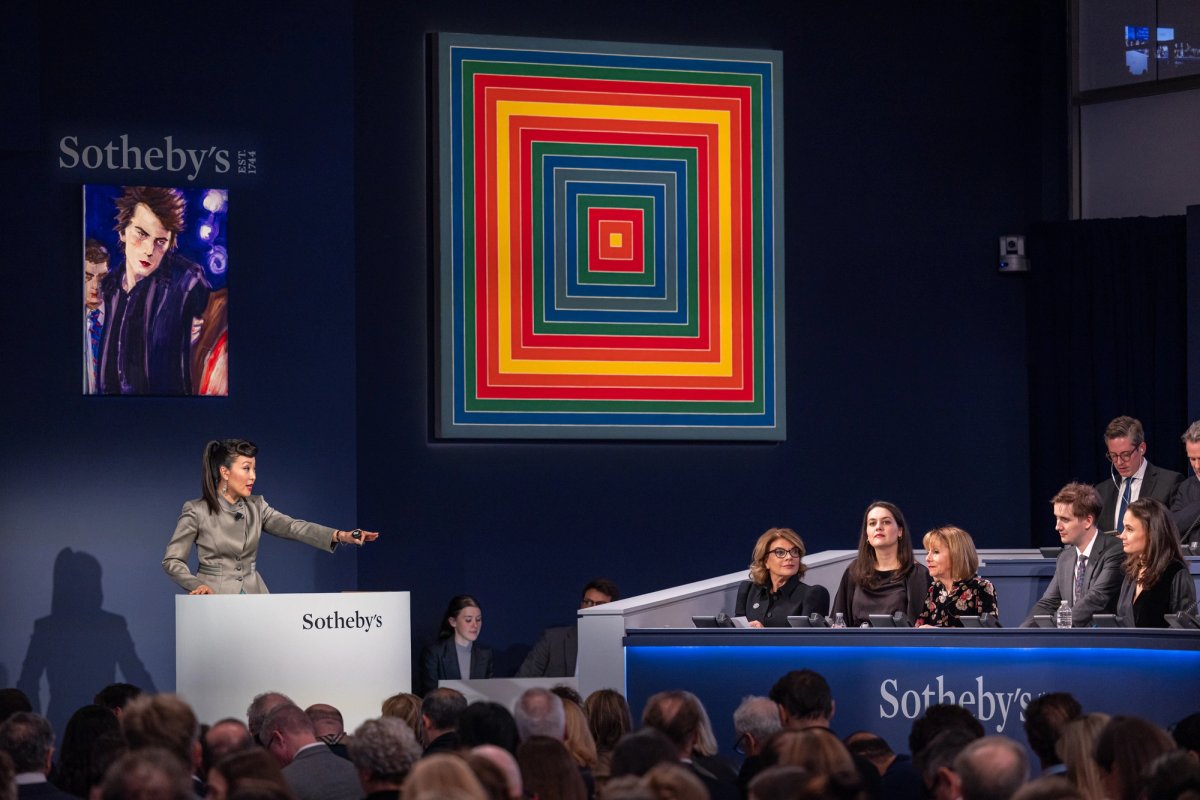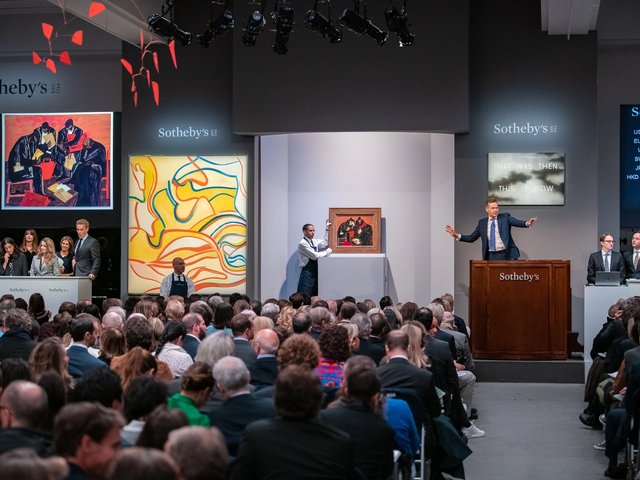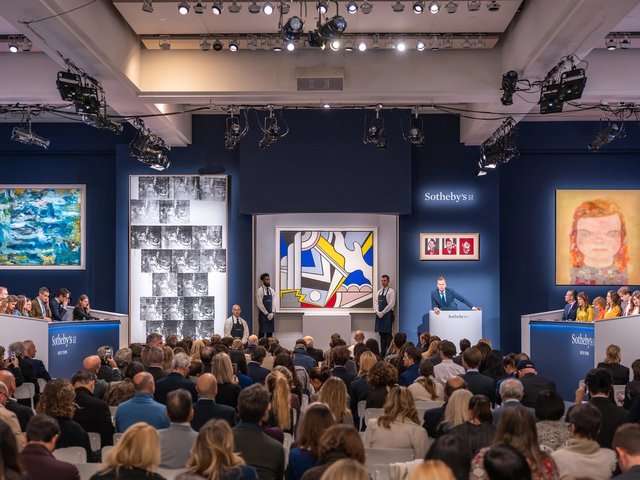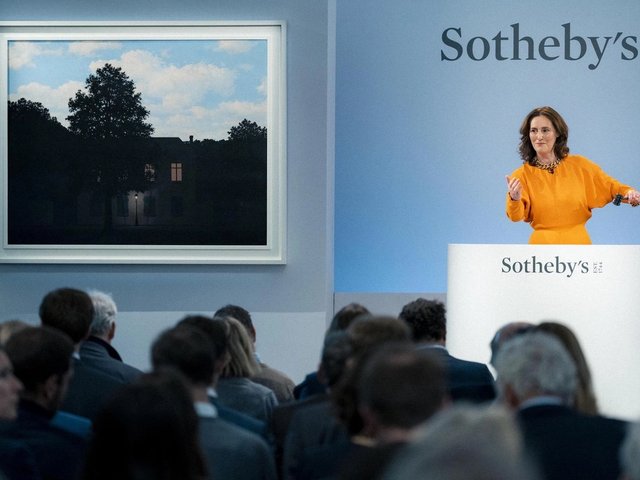The Now and Contemporary evening sales, Sotheby’s dual auctions dedicated to adjacent eras of post-war art, brought in a combined hammer total of $261.5m ($305.7m with fees) on Wednesday (15 November), within the aggregate low estimate range of $245.7m-$349.8m (calculated without fees).
Although the two sales each performed well enough to tiptoe into their respective presale target zones, they generated only modest excitement along the way—a fitting conclusion to an autumn auction season that proved the market remains relatively soft and selective.
Counting the lone lot withdrawn from either sale—Mark Bradford’s 2006 canvas Tina (est $2.5-$3.5m)—the two auctions delivered a muscular sell-through rate of 93.8%. (The figure rises to 95.3% if the withdrawal is omitted.) Yet most of those sales were effectively minted in advance: of the 65 lots originally meant to be offered across both sales, 45 (69.2% by volume) were guaranteed a minimum price by Sotheby’s (including the withdrawn Bradford), and 36 (55.3%) were backed by third parties.
The house’s willingness to offload so much risk onto external financiers reaffirms the unease of the moment. Still, both sales produced at least a bit of heat and a few milestones amid the uncertainties.
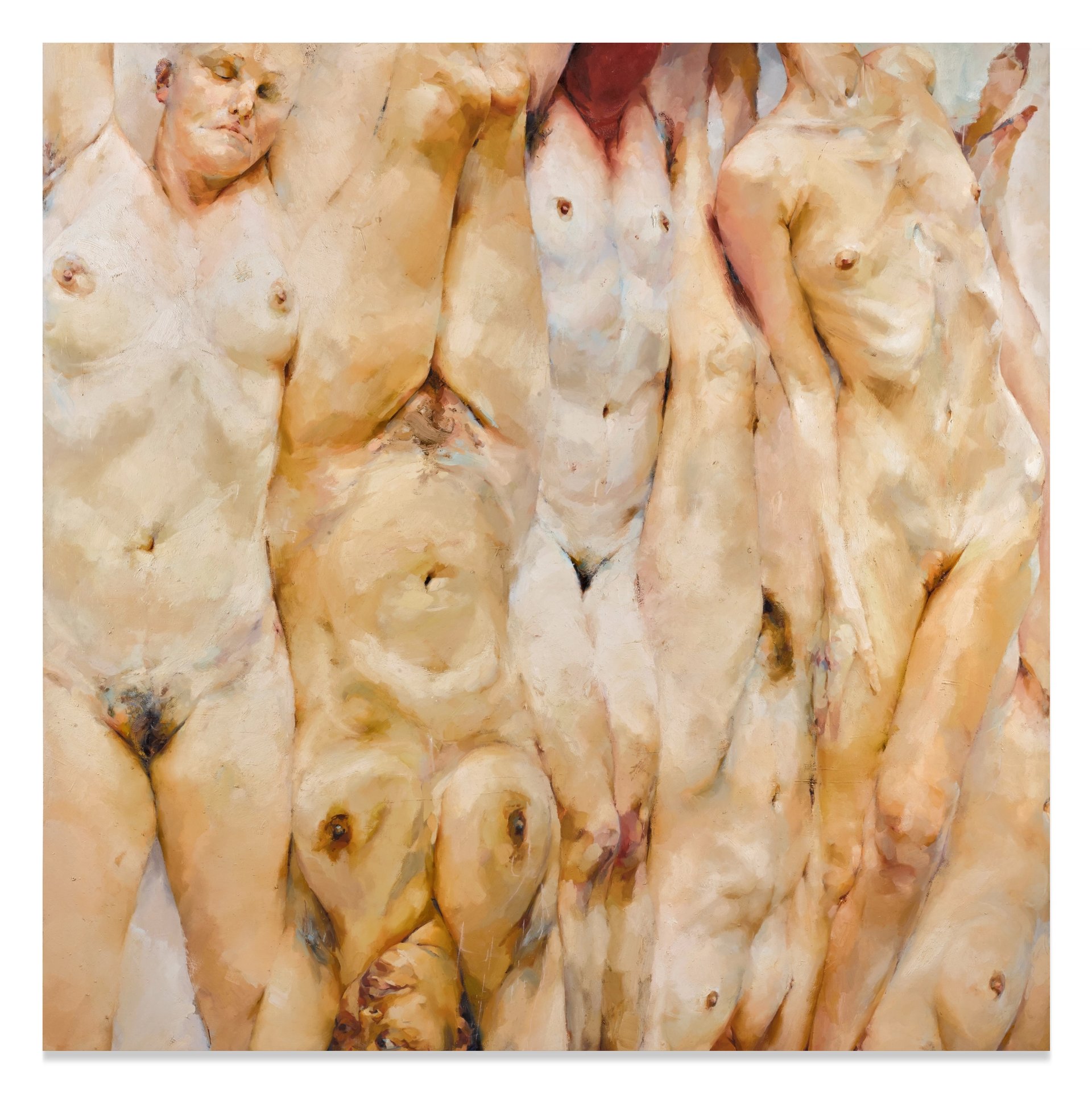
Shift (1996-97) by Jenny Saville Courtesy Sotheby's
The Now
In total, the opening segment of Sotheby’s double-header brought $46.7m ($55.2m with fees), within the original $43.7m-$60.6m expectation. (Omitting the withdrawn Bradford lot reduces the estimate range to $41.2m-$57.1m.) Of the 19 lots originally scheduled to be offered, 13 were guaranteed by the house, and 10 by third-party financiers.
The premium-inclusive sale total was 50% higher than the equivalent figure in the May 2023 edition of The Now, according to a house spokesperson. (It should be noted, however, that Sotheby’s withdrew the star lot of the spring sale, Yoshitomo Nara’s 1998 painting Haze Days, which had been estimated to sell for at least $12m.)
Wednesday evening’s iteration of The Now, centred on art created within the past 20 years, got off to a promising start by setting three consecutive artist records under the hammer. First, Brazilian abstractionist Marina Perez Simão’s untitled 2022 painting went to an online buyer on a final bid of $350,000 ($422,000 with fees), roughly triple its $120,000 high estimate and Simão’s previous auction record of $115,594 (with fees). The painting carried a financial guarantee from both Sotheby’s and a third party.
Next, six bidders pushed the Iraqi artist Mohammed Sami’s The Praying Room (2021) to a hammer price of $750,000 ($952,500 with fees), more than quadrupling the work’s $150,000 high expectation and breaking the auction ceiling set for the artist just last month at Sotheby’s London. Finally, in his auction debut, New York-based British artist Oscar yi Hou’s Mlle. Chris à central park 103rd, en automne (2019) fetched $75,000 ($95,250 with fees) against a $30,000 to $40,000 estimate.
Yet the sale’s expected star lots met more measured bidding. Many anticipated the gargantuan, fleshy Shift (1996-97), a landmark painting by the Young British Artist Jenny Saville, would shatter her own record for the most valuable work by a living woman artist at auction. Instead, it sold for $9.2m ($10.9m with fees), just over the low threshold of its $9m-$12m estimate, after less than two minutes of bidding.
A similar process played out for Kerry James Marshall’s 1992 pool scene (1992). Although it too was expected to sell for up to $12m, the bidding plateaued at its $9m low estimate, reaching $10.3m with fees.
The Saville and the Marshall were both consigned by the flamboyant Chinese entrepreneur Liu Yiqian and his wife, Wang Wei, the co-founders of Shanghai’s Long Museum. Hopes were high that the two works would perform strongly enough to at least somewhat offset the lacklustre results of an auction of 39 pieces from the couple’s holdings at Sotheby’s Hong Kong on 5 October.
That sale made HK$544.5m with fees ($69.5m), well below its presale target range of HK$745m-HK$1bn ($95.9m-$135.5m)—and neither the Saville nor the Marshall did enough to completely close that earlier gap. (A third work in The Now owned by Liu and Wang, Marlene Dumas’s Love Your Neighbour, hammered $500,000 beneath its low estimate of $5.5m, reaching $5.9m with fees.)
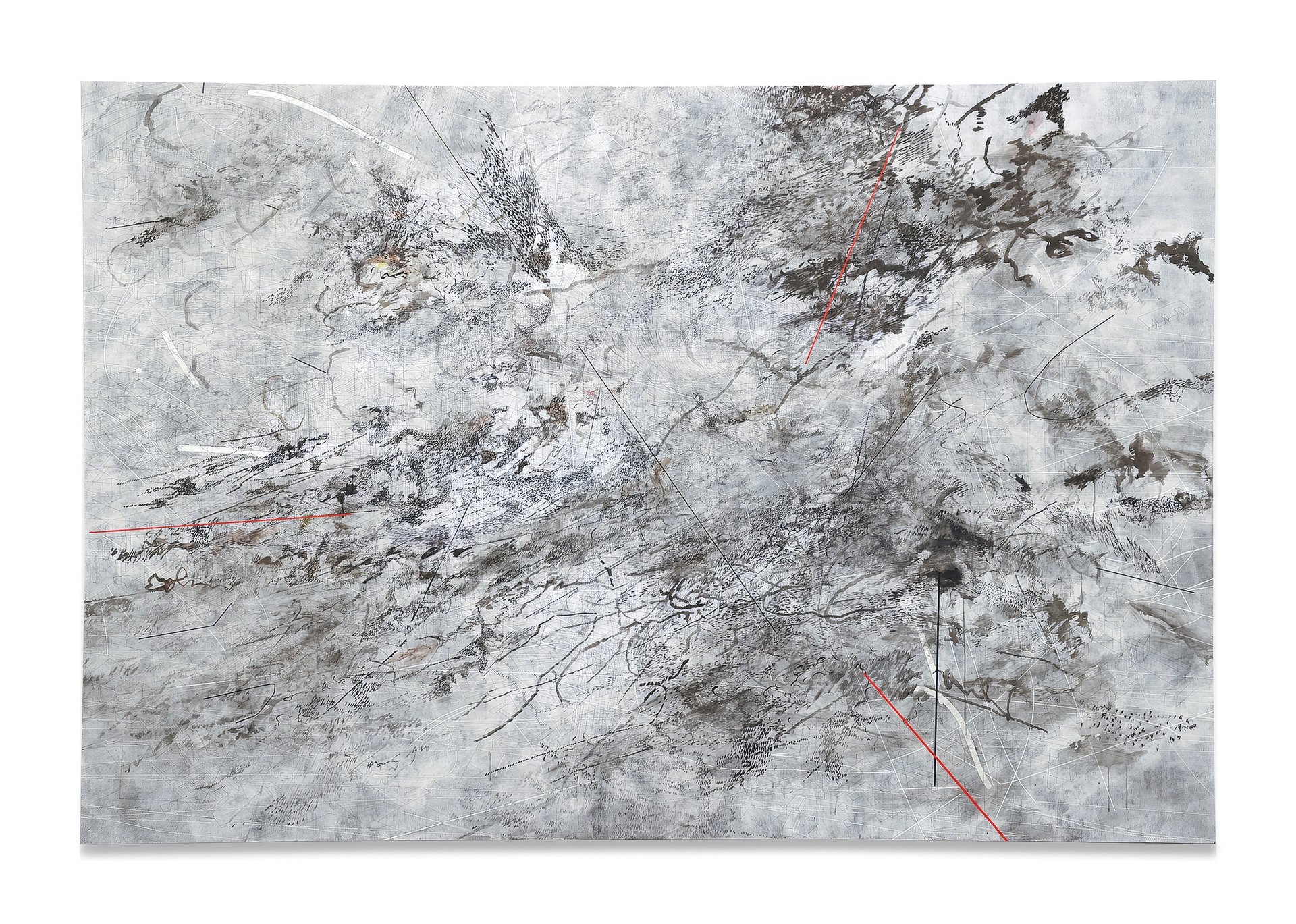
Walkers With the Dawn and Morning (2008) by Julie Mehretu Courtesy Sotheby's
More successful was Julie Mehretu’s monumental Walkers With the Dawn and Morning (2008), which hammered at $9.5m ($10.7m with fees), near the upper limit of its $7m-$10m estimate. The result established a new high mark for an African-born artist at auction.
Other highlights of The Now sale included Teeter towards me (2019), by 30-year-old Jadé Fadojutimi. The painting fetched more than $1.4m ($1.8m with fees), double the midrange of its estimate, thanks to activity from seven different bidders. Jonas Wood’s Interior with Fireplace (2012) also stoked heated competition, with four would-be buyers battling for eight minutes until one prevailed with a bid of $3.5m ($4.3m with fees), comfortably above its $3m high expectation.
After Sotheby’s auctioneer Phyllis Kao brought down the gavel to sell The Now’s final lot, a George Condo that went for $1.5m ($1.8m with fees), the auction house gave her a commemorative white glove in honour of finding buyers for all 18 lots ultimately offered in her first evening auction. (The withdrawn Bradford painting was excused from the calculus.)
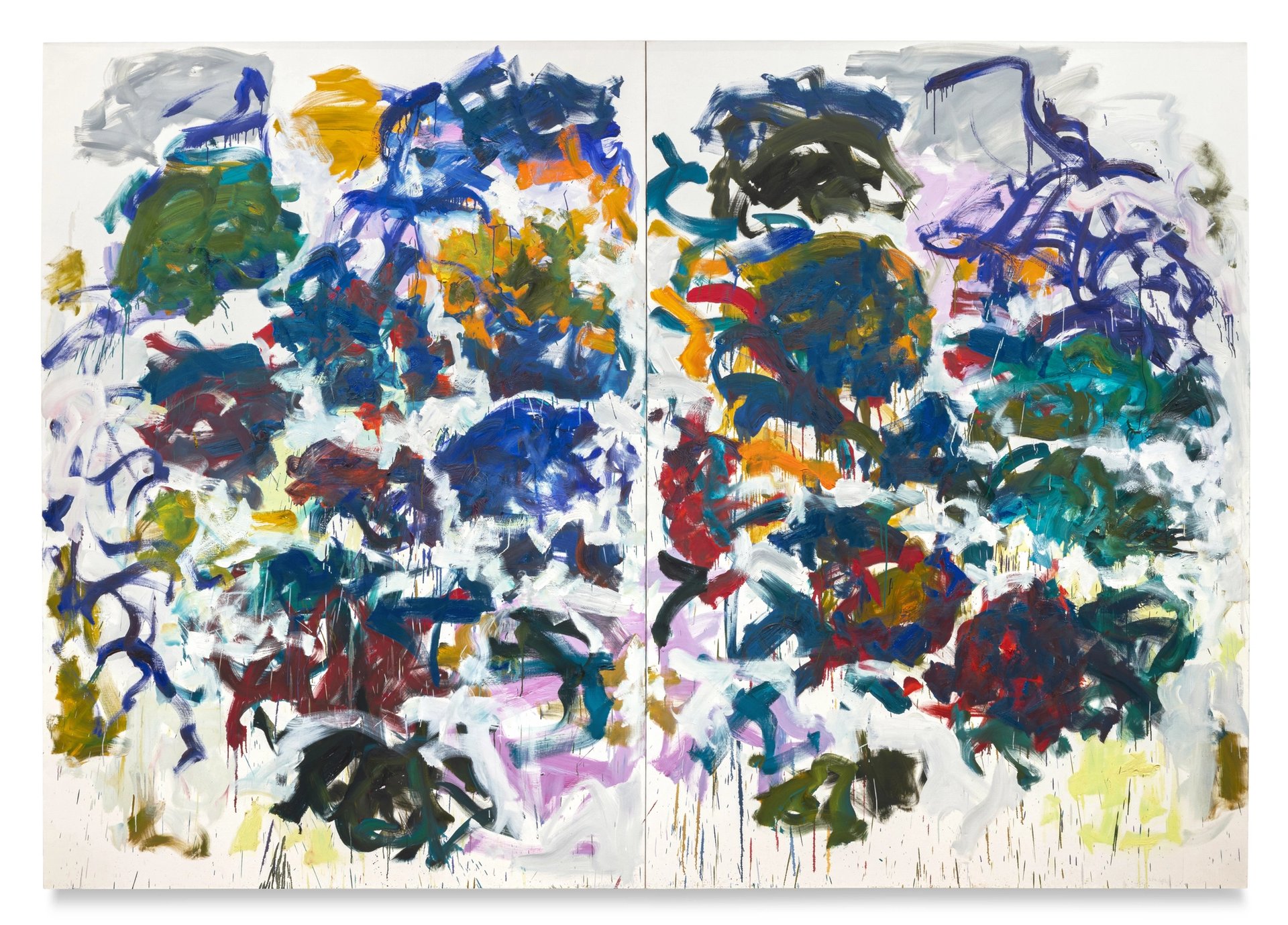
Joan Mitchell’s Sunflowers (1990-91) Courtesy Sotheby's
The Contemporary
The second event at Sotheby’s on Wednesday, the Contemporary evening sale, felt nearly as constrained as The Now, only played out across more lots with higher price expectations (and auctioneer Oliver Barker manning the rostrum). In all, the Contemporary generated a hammer total of $214.7m ($250.5m with fees), modestly within its estimate range of $202m-$289.2m (without fees).
No lots were withdrawn from the sale, and 43 of the 46 that were offered found buyers—good for a sell-through rate of 93.5%. Sotheby’s guaranteed a minimum price for 32 of the works in the Contemporary (including an Ellsworth Kelly painting that ultimately passed at $1.7m); the house also offloaded a substantial proportion of its risk by drafting in third-party guarantors for 26 lots (56.5% by volume).
The opening lot of the auction again started strong. Junker 1 (2009-10) by Amy Sillman set a new record for the artist at auction, fetching $775,000 ($984,250 with fees). The first of the 16 works in the sale from the collection of Chara Schreyer, the late California art collector, it sold for nearly double its $400,000 low estimate. The following lot, an untitled hanging sculpture by Lee Bontecou from 1983, soared to $1.3m ($1.6m with fees) against a $600,000-$800,000 expectation.
Together, the 16 Schreyer works made $43.4m ($52.4m with fees), about one-fifth of the overall total for the Contemporary auction. The collection also contributed one of the more pulse-pounding competitions of the night, as Frank Stella’s Honduras Lottery Co. (1962) elevated above its $15m high target to make $16m ($18.7m with fees). The sale represents the artist’s second-highest price at auction to date.
The best one can say about the auction’s intended star lots, in contrast, was that they performed adequately. The most valuable work of the night, Jean-Michel Basquiat’s celebrated 1982 Self Portrait as a Heel (Part Two), sold for $39m ($42m with fees), a step below its $40m low target, after less than three minutes of bidding.
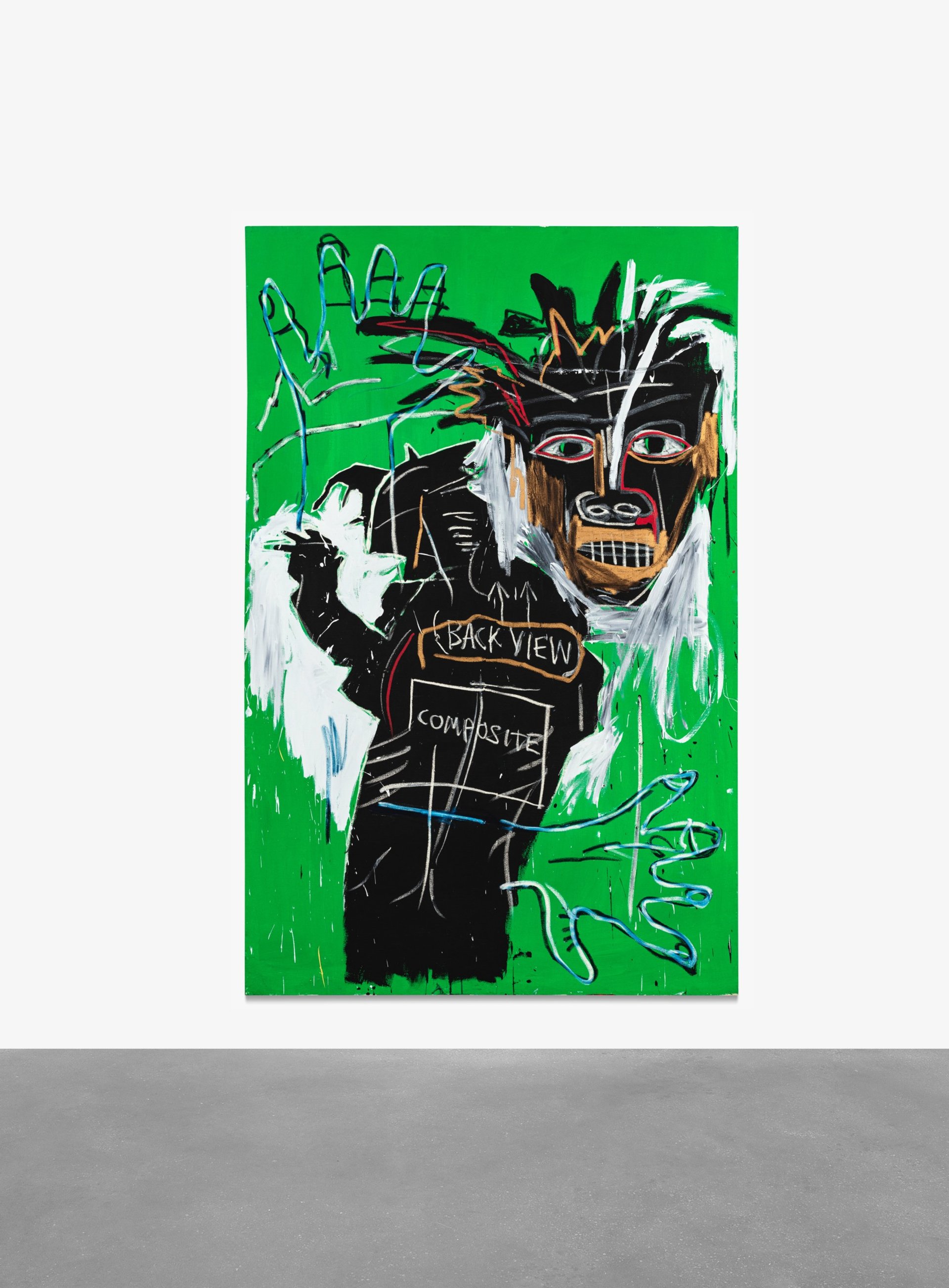
Jean-Michel Basquiat, Self Portrait as a Heel (Part Two) (1982).
Courtesy of Sotheby's
The runner-up from a price perspective, Gerhard Richter’s crimson-dominated Abstraktes Bild (1997) hammered at $27.5m ($31.9m with fees), inside its $25m-$35m estimate range (albeit toward the lower end). Sunflowers (est $20m-$30m), a 1990-91 diptych by Joan Mitchell, narrowly missed breaking the artist’s nascent auction record of $29.2m (with fees), minted one week earlier in Christie’s 20th century evening sale in New York. Sunflowers went for $24m ($27.9m with fees) to a bidder in the room; the result made the painting by far the top lot from the group of works consigned to Sotheby’s this season by New York dealer John Cheim.
On the other side of the ledger, the only other two lots that failed to sell (aside from the earlier-mentioned Ellsworth Kelly) were relatively low-value: a 1990 Ed Ruscha word painting from the Schreyer collection that passed at $1.9m, and a columnar white 1962 Anne Truitt sculpture that passed at $320,000.
A different white Minimalist construction, Sol LeWitt’s Hanging Structure 24 D (1991), closed out the Contemporary sale by making $470,000 ($596,900), just above its $450,000 high target. The crowd and Sotheby’s staff hailed the final descent of Barker’s gavel with the usual round of applause. It felt more like an expression of relief than a celebration. But at the end of such a middling autumn auction cycle, it is fair to wonder how long even that sense of relief will last.


